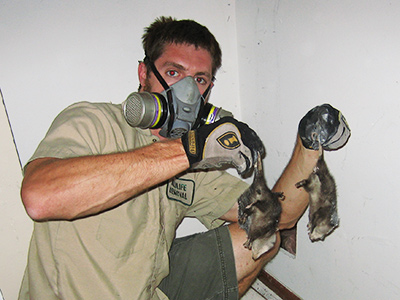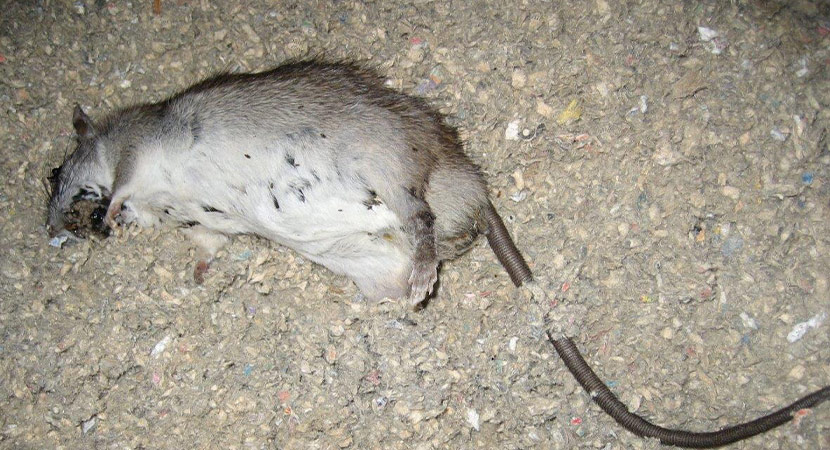Call me: 816-396-5695
Welcome to Kansas City Dead Animal Removal! Got a terrible smell in your house, or do you see a dead critter on your property? We are an animal control company specializing in the removal of dead animals from your home, attic, basement, walls, yard, or any part of your property. You clearly don't want a dead animal in your house. Carcasses attract flies and give off terrible smells, not to mention the potential diseases rotting flesh can cause. Whenever we remove dead animals, we use 100% safe methods and make sure to disinfect your home and get rid of all traces of odor. Click here for Free Roadkill Removal and click here for Dead Pet Body Removal. For deceased wild animals in your home or property, call us anytime at 816-396-5695 to schedule an appointment for today! We come out fast! Some of the services we offer include:
- Dead Animal Removal
- Foul Odor Diagnosis
- Full Property Inspections
- House Damage Repairs
- Dead Body Location Services
- Proper Carcass Disposal
- Cleanup & Decontamination Services
- Deodorization Services
CALL US ANYTIME AT 816-396-5695

Whether you live in an urban or rural area, there is always a risk that you may end up with a dead animal inside your house. It can be a raccoon, rodent, bats, skunks, birds, or your beloved pets. Once you find yourself in that situation, you will understand how unsettling this matter is. There is a chance that the creature died due to a disease that can be transmitted to you. Therefore, we highly discourage anyone from doing a DIY removal of the animal's carcass. We can perform exterior and interior dead animal removal services. We can even handle a dead animal as large as a deer. Our charges will depend upon the amount of work that we need to complete the requested services. We promise that it will be affordable, and our pricing will be transparent. Over the years, we have designed a method that will solve your problem and prevent similar issues. We will continue to refine our strategies by incorporating new technologies and scientifically tested procedures in our programs. We are committed to satisfying our customers by providing them with outstanding services. You will never be disappointed if you choose to do business with us.
What Prices Do We Charge?
Learn about dead animal removal costs - each situation is different!
What if you found roadkill or a dead animal such as a deer in a public place, and you want the city or Jackson County services to remove it for free? Click here for Free Jackson County Dead Animal Removal services. What if a farm animal like a horse, or your beloved pet dog or pet cat has died and you need the body taken away? Click here for Dead Pet Body Removal.
We are experts in dead animal removal, and take our job seriously. When removing dead animals, we do a COMPLETE job — not only do we remove the dead animal from your home or yard, we also decontaminate the area, deodorize it, and dispose of the animal or cremate it. If you aren't sure whether the stench in your house is due to a rotting carcass or another reason, we can sniff it out with our noses from our years of experience. We remove dead raccoons, dead opossums, dead skunks, dead squirrels, dead birds, even dead dogs and cats. We frequently remove dead rodents from inside walls, because poison kills rats and mice, who die in your house. We completely solve your dead animal problem by taking these steps:
- Sniff out the dead animal if it is somewhere in your home
- When necessary, for example if the animal is in a wall or under your house, cut a hole to remove the animal
- Remove the dead animal, safely and completely (and seal the hole if needed)
- Finish the job by decontaminating and deodorizing your home
- Properly dispose of the dead animal through incineration or other means
- Prevent it from happening again by finding out how they got in your house
Dead animal carcass removal is specialty work. Sometimes the job is simple, such as a dead opossum in the yard, in which case we can simply wear our gloves and respirator mask, bag the carcass, and take it away for incineration. Sometimes this is more complex, such as when the dead animal is under a home crawlspace, under a porch or deck or shed. Or if the animal is larger, such as a dog or a deer. The most complex cases are dead animals inside the house. The animal may have died inside the attic, or down in the walls, or the duct work, or any other part of the architecture. You may have a bad smell in your home, and you're not even sure what's causing it. We've removed not just dead animals, but rotting food, bad mold, etc. We specialize in locating the source of the smell, and we very commonly cut a hole in the ceiling or wall to remove the animal. We remove every bit of the carcass, mop up the juices, vacuum the maggots, spray it and wipe it down with disinfectant, cleaner, and we repair the hole we cut. In some cases we use ozone machines to neutralize odor.
Kansas City Dead Animal Tip: How Long Does It Take for Different Animals to Decompose?

If you’ve found a dead animal in your home or neighborhood, disposing of the body is your priority. However, sometimes that’s not a possibility. If the dead animal is trapped in a difficult-to-reach location, such as wall spaces, you may be forced to leave it. Or, if you live rurally and you find roadkill, the authorities may not manage to clear it up. Understanding how long it takes different animals to decompose is of the utmost importance in such circumstances.
What are the factors that affect decomposition?
Decomposition doesn’t occur irrespective of the local conditions. It may seem like things just decay without anything happening. However, hidden from our view, microscopic bacteria and fungi are busy devouring the body. Flies are laying their eggs, and maggots are munching down dinner.
Temperature
All these processes are reliant on various climatic and non-living factors. The warmer the weather is, the faster decomposition occurs. That’s why in tropical rainforests, decomposition occurs rapidly. However, it can be too hot for the process. For instance, in Texas, carcasses can mummify rapidly. Then, further decay slows to a crawl. Conversely, if the temperature is too cold, insects and even bacteria move at a gentler pace. The rhythm of life beats slower. If it freezes, then decomposition can stop almost completely, only resuming in the spring.
Moisture
Another critical factor is moisture. Water is essential for decomposers as for large creatures. In Texas, the lack of moisture in mummified corpses slows the decomposition. Meanwhile, in wet climates, it speeds it up. However, too much rain can wash maggots off a corpse, slowing down the decomposition process. The point is simple. Decomposition in your local area is unique. The speed of decomposition will depend mainly on the factors that surround you.
Above- or belowground
Soil is the remains of millions of animals and plants that have died and grown repeatedly. In soil, trillions of bacteria and fungi await a dead carcass to devour. However, even here, factors such as pH (how acidic the soil is) and moisture play a critical role. If an animal is buried, decomposition will likely speed up, as more of the animal’s body is in contact with the ground. This isn’t always the case. Peat bogs – being devoid of oxygen – have been known to preserve bodies for centuries.
Size of the animal
The final factor to consider is the animal’s size. Larger animals take longer to eat simply because there are more of them to be eaten. Meanwhile, small animals can take hardly any time at all. At the furthest end of the scale is a whale. When they fall to the bottom of the ocean, they form a veritable feast for all the creatures living there. An oasis of nutrition amidst the barren desert of the ocean floor. These behemoths can take 16 years to become skeletonized. However, don’t expect the rat in your wall to take so long.
Decomposition times of common animals
Small mammals: Animals such as rats, mice, squirrels, and even animals as large as raccoons will decompose in a matter of days if exposed to the ground. In your home, the process can take a little longer. However, don’t expect it to last more than a week or so.
Medium-sized mammals: In an experiment with a pig, it took around 365 days for the body to almost fully disappear. However, within 20 to 50 days, the vast majority of the flesh is eaten, only a husk of the body remains. For animals such as dogs and cats, you can expect a similar time length.
Large mammals: For a frame of reference, humans take around three months to decompose. Substantially less time than a whale, but still lengthy when compared to a mouse. Deer or horses will take even longer. Expect a deer carcass to decompose over around six months.
Naturally, these times are estimates. If conditions are warmer, or scavengers have partially eaten the animal, then the process is quicker. Whereas, if the climate is cool or you are entering into winter, the carcass may persist into the spring before decomposition completes.
We service nearby towns such as Kansas City, North Kansas City, Independence, Overland Park, Shawnee, Roeland Park, Mission, Leawood, Lenxa, Lake Quivira, Edwardsville, Piper, Riverside, Gladstone, Claycomo, Pleasant Valley, Randolph, Brimingham, Platte Woods, Sugar Creek, Blue Summit,.